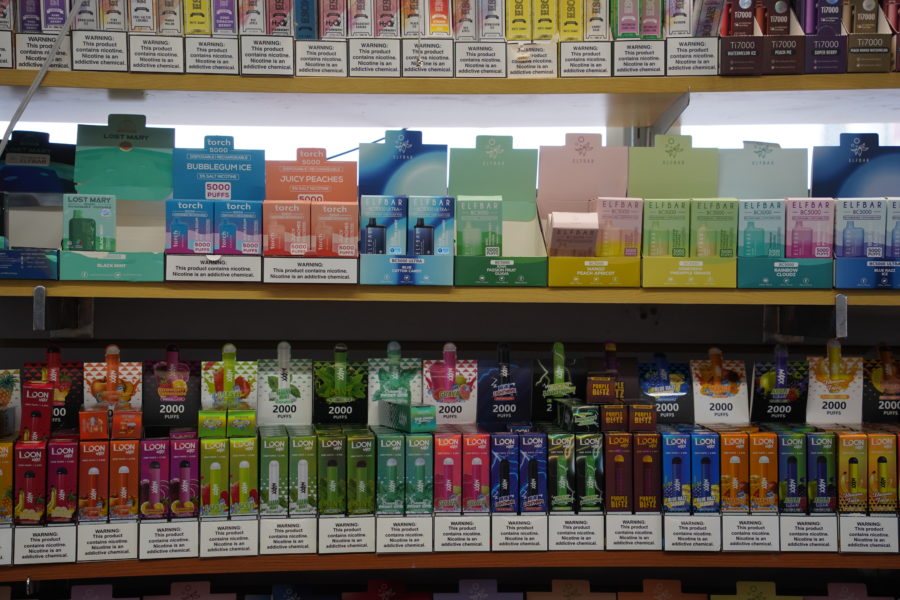A bill banning the sale of flavored tobacco is leaving some tobacco shops and tobacco users with concerns.
Products like menthol cigarettes, flavored vapes and other flavored nicotine and tobacco products will be banned if the bill passes. The measure won’t punish anyone owning flavored tobacco but would prohibit businesses from selling it.
While the sale of flavored tobacco is already banned or restricted in multiple cities and counties across Minnesota, this bill would prohibit the sale statewide. The bill was introduced on Feb. 27 but has not been passed by the House or the Senate yet.
The Minnesota Attorney General Keith Ellison and the state of Minnesota are already suing Juul Labs and tobacco-producer Altria for purposefully advertising to kids through flavors intended to attract young people and deceptive advertising designed to hook children on nicotine. The trial began at the end of March.
“Kids are attracted to what is shiny, slick, cool,” Ellison said in his opening statement of the lawsuit. “That is exactly who Juul and Altria were targeting and preying upon.”
Tobacco shop expresses concerns
With menthol cigarettes and flavored nicotine making up a large percentage of sales for many tobacco shops, some fear the ban will negatively impact businesses.
Some tobacco shops rely on the sale of flavored tobacco to keep profits up. Without these products, some are nervous they will close.
Minneapolis had 52 tobacco shops and 82 retailers that sold menthol tobacco in 2019, according to the city of Minneapolis.
Manager of Royal Cigar and Tobacco in Dinkytown, Moustafa Elsayed, estimated around 90% of their sold products would be banned under the new law.
“A lot of businesses are going to close. A lot of people are going to be out of jobs,” Elsayed said.
If Minnesota bans these products, black market sellers could drive outside of the state to buy these products and then sell them here, according to Elsayed.
“There is supervision at smoke shops. We check IDs,” Elsayed said. “If they ban it, there is gonna be a black market and they’re not gonna check.”
Gabriel Wright, an 18-year-old senior in high school, began smoking tobacco products in middle school. Wright said he will still find a way to get flavored tobacco products, even if a ban is put into place.
“I could drive to Wisconsin. It’s not too far from here,” Wright said.
What will and won’t be banned
The measure would prohibit the sale of all artificially-flavored products of tobacco, tobacco-related devices, electronic delivery devices, or nicotine or lobelia delivery products.
Flavored products of vapes, e-cigarettes, shisha, menthol cigarettes, nicotine pouches and chewing tobacco would be taken off store shelves. Some of the specific banned flavors mentioned in the bill include menthol, mint, wintergreen, vanilla and any candy flavor, though banned flavors are not limited to these.
Delta-8 substances, dab pens, wax pens, non-flavored disposable vape pens and unflavored cigarettes will still be available for sale and purchase if the law is passed.
Minnesota would become the sixth state, behind California, Massachusetts, Rhode Island, New York and New Jersey, to ban flavored tobacco products to some degree statewide.
If the bill is enacted and a shop is caught selling banned products, the punishments are the same as if the shop sold tobacco to minors. The punishment for the first violation is $75, $200 for the second and $250 and a minimum week-long suspension of their tobacco-selling license for the third offense.
The ban would go into effect on Aug. 1 if the bill is passed. Tobacco shops would have until then to sell the products affected by the ban.
Health effects and marketing
Some supporters of the ban say it would reduce the use of flavored tobacco products by minors and protect people from the negative health effects associated with them.
Because vapes and e-cigarettes are fairly new products, the long-term health effects of these devices are still unknown. However, these products contain chemicals linked to addiction, birth defects and cancer, according to the Centers for Disease Control and Prevention (CDC).
Medical experts also raise concerns about the rates teenagers and young adults vape and smoke tobacco. Current studies suggest nicotine exposure can harm the development of the brain, according to the CDC.
The Consumer Advocacy for Smoke-free Alternatives Association (CASAA) is opposing the ban over fears it would remove safer alternatives to smoking.
“Minnesota’s flavor ban would undermine any decision by the FDA allowing low-risk, flavored tobacco products on the market,” CASAA stated on its website.
Many medical professionals perceive flavored products as having a “gateway effect.” A majority of youth who smoked e-cigarettes or tobacco first smoked a flavored product, according to the MDH.
University student and former smoker Ben Anderson began vaping as a freshman in high school.
“I started with the fruit flavors [of vapes] … but then I went down the line from like the fruity vapes to actual tobacco,” Anderson said.
Opponents of the ban argue that if a product has harmful health effects, then consumers should make the decision whether to buy it, not the government.
Tobacco shop workers like Elsayed said a ban would be hypocritical because if products with similarly bad long-term health effects remain legal, then flavored tobacco should not be an exception.
“A lot of people drink alcohol — that has proven bad health effects,” Elsayed said. “Do kids in high school not drink? Yet they don’t ban alcohol.”
Elsayed said the ban will do more harm than good.
“You’re just making us go out of business, alongside other businesses like us,” Elsayed said. You’re not helping the kids. You’re not helping anybody.”








